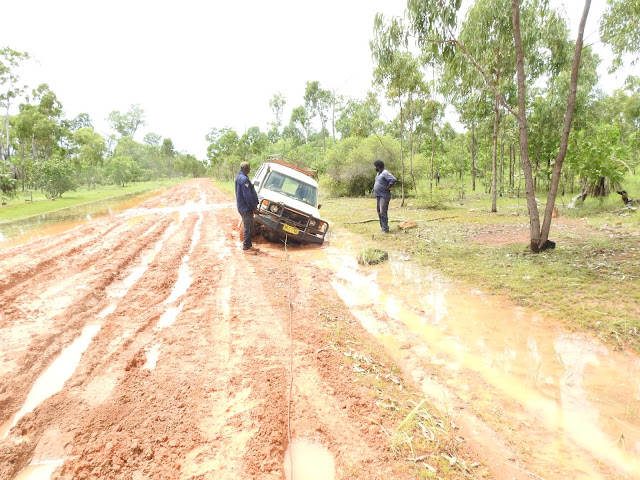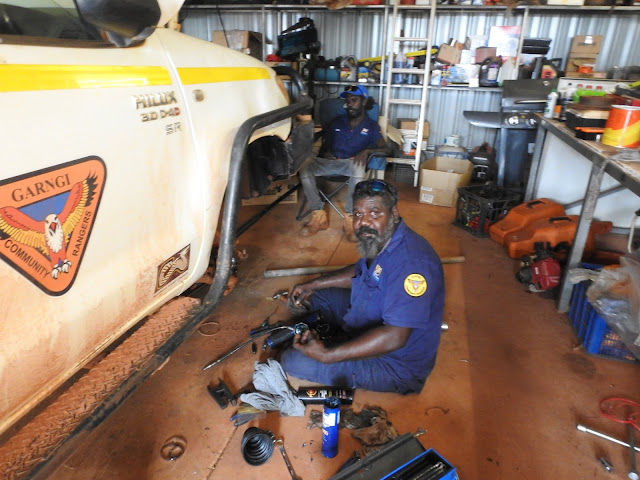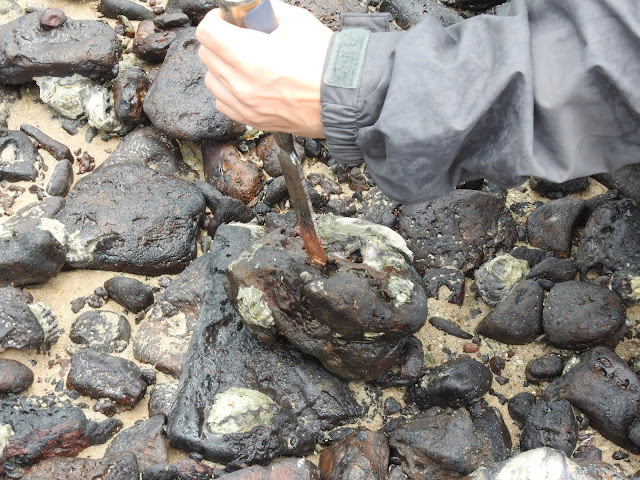Hi and greetings from Croker Island, NT.
As I write this blog we are passing through a period when the monsoon is a little less active. We are still receiving rain however not as much as a week or so ago.
Consequently the roads and tracks have become 'challenging'. The road across the floodplain to the airport became impassable so we had to take a much longer road to the airport however this road too became boggy in places which resulted in this 'unplanned stop'.
During the wet season while we are restricted in our access to many parts of the island, it is a good time to catch up on some maintenance. Here Clayton replaces a CV joint boot on our 4WD Hilux.
A few weeks ago we had some scientists from the NT Government's Fishery Department visit to conduct a survey on oysters, in particular 'Black Lipped Oysters'. This involved taking the scientists to numerous locations around the Croker Island at low tide to collect oysters for DNA and heavy metal tests. Below a group photo of our visitors, some of the Garngi Rangers and one of the traditional owners.
The collection process was to travel to known sites where black lipped oysters grow at a reasonably low tide.
Then to carefully chisel the oyster off the rock without damaging the oyster.
Water temperature and salinity where measured and recorded - below by Katrina.
The oysters were then placed in an esky with some water collected from the collection site. Below Eslyn shows how it is done.
Sadly, the odd oyster was damage during the removal process - so they just had to be eaten. Below is an example of the the Black Lipped Oyster. Given our remote location away from heavy metal pollution it is thought that Black Lipped Oysters could be an exciting business possibility for these communities.
Back at the ranger base the collected oysters were measured .......
And then recorded and prepared for transport to Darwin for DNA and heavy metal testing.
Some of the Garngi Ranger's work involves doing contract work for the Australian Quarantine and Inspection Service (AQIS). As Croker Island is the most northern community in the NT we are at the 'frontline' as far as the early detection of unwanted plants, animals and disease is concerned. Below, Katrina and Adam use an iPad with an AQIS app to conduct an Aquatic Biosecurity Survey.

Around 20 years ago cane toads arrived in the NT from Queensland. Since then they have crossed the northern part of the NT and are now well into the Kimberleys, WA. These tough and adaptable little creatures have even established themselves at Lajamanu in the northern Tanami Desert. Their arrival resulted in drastic reduction in the populations of many native animals. Thankfully they are not at Croker Island. Just because we are on an island does not mean we can relax though. Cane toads can easily hitch a ride in pallets and other freight containers. Below the rangers check a cane trap setup near the barge landing.

In earlier posts I have talked about our weed work controlling the floodplain weed, Mimosa. Another Class 'A' weed that we have here on the island is called 'Bellyache Bush'. Class 'A' means that the landowner, by law, must be making serious efforts to eradicate this weed. Below Steven points to a Bellyache Bush discovered in one of the old dumps on the island - a job for next week - weather permitting.
Below Bryan explains to a ranger who had just filled the wipper snipper with the incorrect fuel, the difference between a two and a four stroke engine.
Some drone footage of horses on the floodplain. Take particular notice of the rump of the horse on the far right - the result of a very close encounter with a crocodile. Salt Water or Estuarine Crocodiles come into floodplains for breeding and also the plentiful food supply that is available at this time of the year.
Getting up close to some Magpie Geese on the floodplain.
Nance has had to delay her return to Croker Island due to delays in the renovations. She is keeping busy catching up with friends and family and also regular visits to her mother.
Until the next blog post, take care and stay safe.

















Comments